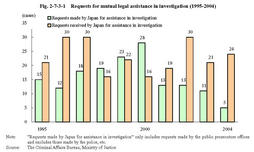| Previous Next Index Image Index Year Selection | |
|
|
1 Assistance in investigation etc. (1) International cooperation for assistance in investigation If any evidence necessary for the investigation of a criminal case in Japan(including supplementary investigation for trial,hereinafter the same in this Section)exists in a foreign country,Japan requests assistance in investigation by means of comity of nations through diplomatic channels,in principle.If Japan is requested by a foreign country to provide evidence necessary for the investigation of a criminal case,Japan can provide assistance in investigation in accordance with the requirements and procedures provided in the Law for International Assistance in Investigation etc.(Law No.69of1980)under the guarantee of reciprocity,even to foreign countries that have not concluded treaties on assistance with Japan.
Japan had not concluded any bilateral treaty with any foreign country.However,for the purpose of further strengthening cooperation for assistance in investigation,as the product of the negotiation for the conclusion of a treaty with the United States since1999,Japan signed the Treaty between Japan and the United States of America on Mutual Legal Assistance in Criminal Matters(hereinafter referred to as the"Japan-U.S.Mutual Legal Assistance Treaty")in August2003.The conclusion of the treaty was approved by the Diet in May2004(not yet enacted).Under this treaty,while the implementation of assistance is defined as a legal obligation,the provisions were made to ensure that assistance will be promptly and surely provided,such as those for sending and receiving requests for assistance through the predetermined"central authorities"instead of through the diplomatic channels,and relaxing of the conditions for providing assistance to a certain extent. Since November2004,Japan had negotiated with South Korea for concluding the Mutual Legal Assistance Treaty,and reached a substantial agreement in August2005.Furthermore in June2005,Japan launched preliminary talks with China regarding the conclusion of international agreements between Japan and China in the criminal field including the Mutual Legal Assistance Treaty. Under the multilateral treaties that have recently been developed to deal with transnational crimes,it is provided that the Contracting States shall provide one another with the maximum assistance in investigation,prosecution and judicial proceedings on certain offenses stipulated in the treaties.Also,with the aim of achieving more effective assistance,the provision concerning the designation of the"central authorities"is set up in the treaties("U.N.Convention against Transnational Organized Crime"etc.referred to Section1of this Chapter). (2) Request from Japan to foreign countries for assistance in investigation etc. When requesting assistance to a foreign country in collecting evidence necessary for the investigation of a criminal case in Japan,the public prosecutors office or the police etc.make such a request through diplomatic channels.
When the public prosecutors office makes a request for assistance,the request is generally referred to and in order of the Ministry of Justice,the Ministry of Foreign Affairs,the Japanese diplomatic establishments in the foreign country,and finally to the Ministry of Foreign Affairs of the foreign country.In the case of a request made by the police,it is referred from the prefectural police to and in order of the National Police Agency,the Ministry of Foreign Affairs,the Japanese diplomatic establishments in the foreign country,and finally to the Ministry of Foreign Affairs of the foreign country.Such a request is handled by the juridical authorities etc.of the foreign country to which the request was made. Under the Japan-U.S.Mutual Legal Assistance Treaty,the Minister of Justice and the National Public Safety Commission are designated as the"central authorities".Therefore,after the enforcement of the treaty,the Ministry of Justice or the National Police Agency of Japan will be able to send requests for assistance directly to the Department of Justice without using diplomatic channels. Another way of seeking cooperation from foreign countries such as the provision of information and materials necessary for the investigation of criminal cases is the use of the International Criminal Police Organization(ICPO).In this case,a request for cooperation made by prefectural police is generally referred to the National Police Agency,as the national central bureau of the ICPO in Japan,and then sent to and handled by the police of foreign countries that are ICPO members. Fig.2-7-3-1 shows the trend of requests for mutual legal assistance in investigation over the last10years. Fig.2-7-3-1 Requests for mutual legal assistance in investigation(1995-2004) Over the last10years since1995,a total of157requests were made by the public prosecutors offices for assistance in investigation to28foreign countries(including regions)through diplomatic channels(Source:The Criminal Affairs Bureau,Ministry of Justice).By the police,15requests for assistance in investigation to foreign countries were made in2002,10in2003,and14in2004(Source:The Criminal Investigation Bureau,National Police Agency). (3) Request from foreign countries to Japan for assistance in investigation etc. The Law for International Assistance in Investigation etc.provides the procedures to be followed in the case of receiving a request from a foreign country to provide evidence and in the case of receiving a request from the ICPO for cooperation.
Fig.2-7-3-1 also shows the trend of requests from foreign countries to Japan for assistance in investigation over the last10years.A total of229requests from35foreign countries(including regions)were received by Japan(Source:The Criminal Affairs Bureau,Ministry of Justice). After the enforcement of the Japan-U.S.Mutual Legal Assistance Treaty,the U.S.Justice Department will send requests for assistance directly to the Ministry of Justice of Japan without using diplomatic channels. |
